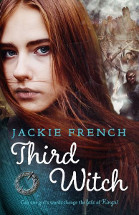Third Witch by Jackie French

Angus and Robertson, 2017. ISBN 9780732298531
(Age: 14+) Highly recommended. Themes: Macbeth; Shakespeare; Power
and ambition; Royalty. Shakespeare's Macbeth is an
incredibly powerful story of the insidious impact of uncontrolled
ambition, drawing the main characters into a maelstrom of madness
with their moral compasses twisting in response to the choices they
have made; choices based on the 'counsel' of witches. Jackie French
has woven a tale into this Shakespearean drama, with her central
protagonist, Annie Grasseyes, acting as the Third Witch. This simple
village girl now works as Lady's maid and companion to Lady Macbeth
and at the behest of her employer acts as the prophetic 'Third
Witch' in response to the powerful woman's desire to spur the
ambition of her husband. The slow downward twisting of the central
characters of the Macbeth story are then revealed as the words
spoken play out in their lives. The witches are portrayed as
'actors' and speakers of unwittingly persuasive words, rather than
as supernatural participants who can influence the future.
Jackie French has very cleverly created a back story and context for
the original dramatic text setting (while being very conscious of
its lack of historical veracity due to the influence of James I's
views on the dramatist's work). The original Shakespearean words are
woven into the novel with recognisable phrases scattered
appropriately through the plot. There is also a romantic tangle for
Annie. Through this all, the original text is honoured and the book
would be a fantastic read for students who struggle with the
complexity of the Shakespearean language but want to understand this
critical text. (Although they should always read the original text
first!) Jackie French adds notes at the end of the text explaining
several recipes and commenting on some of the social complexities
and motivations of the characters, as well as her own motivations
and love of Macbeth.
A very powerful book. Highly recommended for age 14+ (Some
understanding of Macbeth would add appreciation to the
reading of this novelisation.)
Carolyn Hull